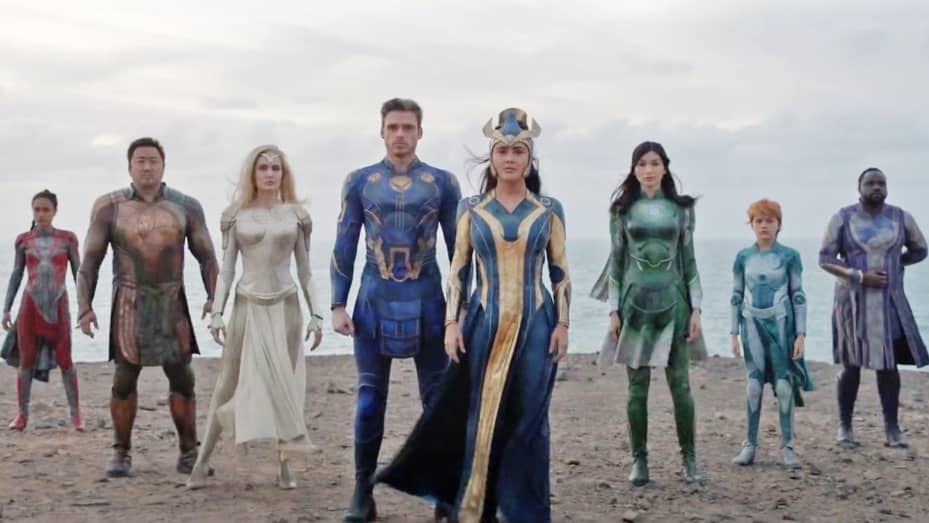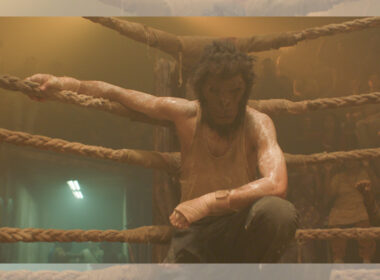Rating: *
I bet there is a book, somewhere in a vault, where all the rules of a Marvel blockbuster are written. With the obsessive diligence of a dogmatic religious fanatic, every artist tasked with working on a new project needs to follow the commandments under the penalty of unspeakable horrors to them or their family. This book has a compendium of decades of studies in psychology and details how to harness and exploit the whims of an entire generation of full-grown adults living in a state of arrested development. The book explains, to precise scientific detail, the optimal way for the brain to create the necessary dopamine that keeps an impressionable mind distracted but convinced it’s witnessing a glorious universal truth.
The book analyses other artists, better artists, unique and influential artists. It pinpoints the elements that make them stand out, to be recreated in a different medium and without artistic context. The book is sealed with seven keys, and only one man named Kevin, the mastermind behind this cinematic mastodon that doesn’t show signs of extension, gets to read it, for the book consumes all. It takes artists, writers and filmmakers under its protection and corrupts their instincts with generic social commentary and bland philosophies. The book is like Tolkien’s ring, and behind it an army of Gollums march to convince us that this long futile saga is anything but an amusement park.
The victim, this time, is Chloé Zhao, whose meteoric rise peaked this year when her third feature, Nomadland, won her a surprise, and frankly well-earned, Oscar for best director. The dust hasn’t settled on that front, and Zhao is already making her shift to the big Marvel Cinematic Universe machine. The promise is that Zhao can bring the auteur’s pedigree and attach her style of emotional cinema verité to the sci-fi excesses of the studio. The reality is there is little interest to steer away from the formula. Whoever is at the helm sees their work muddled and confused by the one essential truth in the whole business model – the only thing that ever matters is the plot.
You will see Eternals; everyone will. Marvel’s movies effortlessly make it past the billion-dollar mark before even hitting the streaming services, and by then, they become staples of all our homes without us even noticing. The story and its characters are not necessary; for what matters is where this films fits in this long-running continuous saga of pop culture colonisation.
Still, if you’re curious – the Eternals are deity-like beings created by literal Gods (the Celestials) tasked with protecting every planet in the universe from the demon-like monsters (the Deviants). The ones on Earth have been here for more than 7,000 years, waiting for further instructions, living among us quietly without interfering in the natural progress of human evolution. They are the warrior Theena (Angelina Jolie), the leader Ajak (Salma Hayek), the powerful Ikaris (Richard Madden), our protagonist Sersi (Gemma Chan), the rebellious Sprite (Lia McHugh), the genius Phastos (Brian Tyree Henry), the fast Makkari (Lauren Ridloff), the strong Gilgamesh (Ma Dong-Seok), the other rebel Druig (Barry Keoghan) and Kingo (Kumail Nanjiani), the comedic relief.
For two-thirds of the film, we follow the group as they come together to fight a new, unexpected Deviant threat while rekindling old flames and past disagreements. For some of them, the rule not to interfere is especially hard to swallow in the wake of war, torture and genocide. The film deals with this moral quandary in particularly tone-deaf ways, like one of our heroes (played by an American actor) crying in the ruins of Hiroshima.
The stakes are high for Sersi, Kingo and Phastos, who grow attached to humanity. Especially Sersi, falling in love with dear old mortal Dane Whitman (Kit Harington), and Phastos, who retired to a suburban paradise with his husband and child.
But none of this matters because the film doesn’t let us, nor its characters, stop and reflect. See the moment Harington finds out his girlfriend is actually an immortal superbeing who just fought a gigantic otherworldly and terrifying monster in the streets of London. In what is by itself a life-threatening and traumatic experience, the emotional implications of finding out his love is millions of years old is reduced to a moment of making a funny quip about her ex-boyfriend. No one is allowed to feel until the plot tells them to; no one is allowed to show any emotion until that can be exploited and explained in its due course.
The meta-commentary is that a film about Gods on Earth, controlled by Gods in space, exists by design for the whims of their own creators (Zhao), controlled by higher voices (the producer) for the benefit of the all-mighty (the profit). And if I thought the film was this self-aware, I would’ve found it amusing. Instead, it’s just regrettable.
Scorsese was right when he said Marvel films are not cinema, but rollercoaster rides, and Eternals is its epitome. A two-and-half hour-long funfair built by some of the most creative people in the business but with nothing unique to say. It’s fun, exciting, thrilling and engaging, but does not linger when it’s over. It’s innocuous, sturdy, well-built and reliable, but only a piece of decoration. It will make a billion dollars, but it won’t break any hearts, and because of that, I ask – what’s the point?




